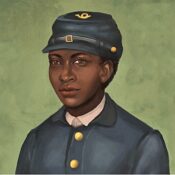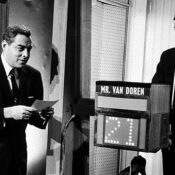Jesse Owens’ triumph at the 1936 Berlin Games was marked not only by his gold medals but by his grace and dignity in the face of racial hostility. In the second of a seven-part Post series he wrote in 1976 on the “spirit, courage, and enduring qualities of the Olympic Games,” the track star remarks on his unlikely friendship with an athlete from Nazi Germany.
1936: Golden Moment of Triumph
By Jesse Owens
Excerpted from an article originally published on January 1, 1976
We have to remember that more than victory itself, the Olympic Games teach us a sportsmanship that transcends all prejudices and national and racial lines. That year was a very difficult year because Hitler had declared the dominance of the German Aryan race, and we had the impudence to come over and prove him wrong in so many cases.
But there was one incident that happened in those Olympic Games which I shall never forget and which represents to me an example of how friendship and sportsmanship can transcend all obstacles when given the opportunity. The broad jump was an event that I was supposed to win with some ease because in the past I had failed only once to win first place in every track meet in which I had participated in my entire athletic career. But on this day, something was going wrong. I couldn’t imagine what was happening to spoil my jumping technique, but I had jumped only 23 feet 6 inches as a qualification effort and apparently was about to be eliminated.
But there happened to be a young German broad jumper, Lutz Long, the greatest of them all in his own country, who was watching as I took my qualifying jumps. I had already fouled twice, and it looked as though I might not even be able to survive in the competition. But he came over and remeasured my steps, remeasured my takeoff mark, and he laid out my sweatshirt right next to the takeoff board as a marker to help my jump. Thanks to his suggestions and confidence in me, I was able to produce a leap which qualified and opened up the pathway to ultimate victory.
Lutz Long jumped 25 feet 9 27/32 inches for a new Olympic record. I managed 26 feet 5 5/16 inches and so won. Lutz was second; but in my book of sportsmanship he ranks first.
You can imagine how touched I was at such sportsmanship. My friendship with Lutz Long, which commenced so brightly on the field of competition, continued after the Games. We became great friends and we corresponded regularly. But during World War II, sometime during the invasion of Poland, the last living traces of Lutz Long were obliterated in the Holocaust.
In 1951, I returned to Germany, and among a delegation which came to visit me at the hotel where I was staying, there were a woman and a boy who came up and introduced themselves to me. This boy was the son of my lost friend, Lutz Long, and his name was Kai. Lutz Long had been only 22 at the time of the Olympics, and as the preparation for World War II rushed across Germany, it transpired that this little boy had seen his father only three times in his life. And so I began to correspond with Kai, and then we developed our own friendship that arose from the father’s noble and self-sacrificing sportsmanship and generosity. Kai Long and I continue to correspond and whenever I hear from Lutz’s son, my mind goes back to that afternoon in the Olympic Stadium when an athlete sacrificed his fame and victory for the sake of pure sportsmanship. And then I know that the Olympic ideal is something that should be cherished and never forgotten.
You can read Jesse Owens’ article in its entirety here. For more of our historical coverage of the Olympic Games, check out “The Summer Olympic Games: Heroes, Hope, and Hostility.”
Become a Saturday Evening Post member and enjoy unlimited access. Subscribe now



Comments
Every young person in athletics or not should
Read this story about what life should be about
I just read “Boys in a Boat”. The feature on Jesse Owens compliments the story exceptionally well.
Interesting especially in light of the hand shake stub in Rio this week
Thank you for reprinting this vintage POST feature on the one-and-only Jesse Owens. He definitely triumphed over adversity being a black man in that day and time, in Germany, with Hitler’s power and desire painfully and shockingly apparent in the illustration background.